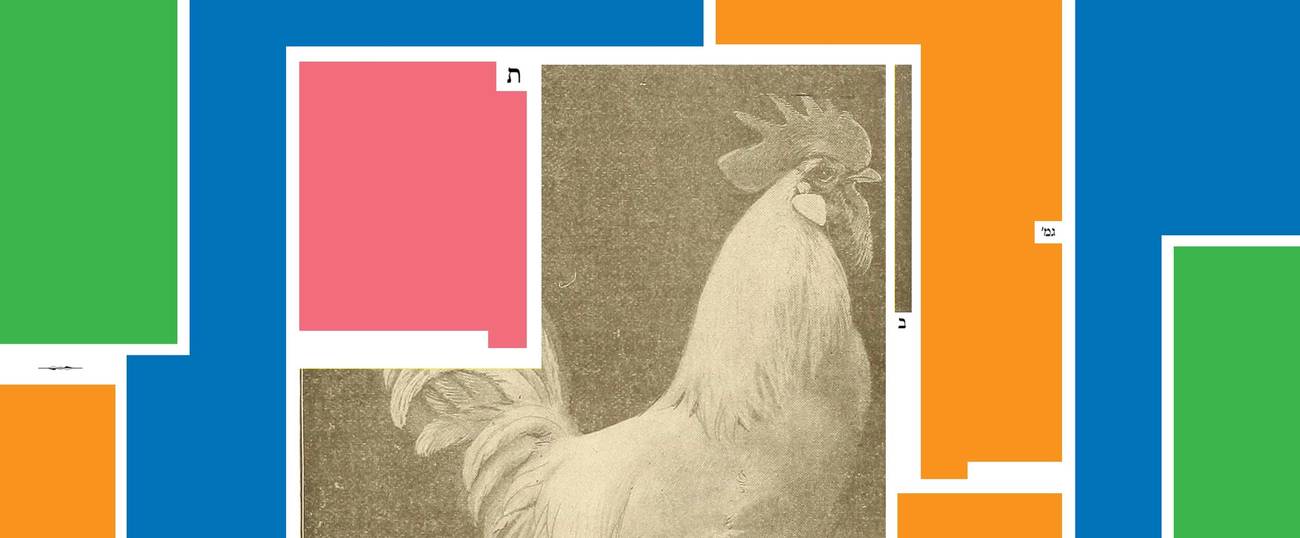Thou Shalt Sell No White Rooster and Bow to No Idols
Daf Yomi: How could Jews live as a minority among peoples, the Romans and the Persians, whose religion they considered sinful?




Literary critic Adam Kirsch is reading a page of Talmud a day, along with Jews around the world.
As readers of the Bible know, monotheism was not a discipline the children of Israel learned easily. From the golden calf down to the Babylonian Exile, idol worship was an addiction they could not seem to break. The prophet Jeremiah had to keep hammering home the lesson that idols are mere things, made by human hands, and that worshipping them is “a doctrine of vanities”:
“Silver spread into plates is brought from Tarshish, and gold from Uphaz, the work of the workman, and of the hands of the founder: Blue and purple is their clothing: They are all the work of cunning men. But the Lord is the true God, he is the living God, and an everlasting king: At his wrath the Earth shall tremble, and the nations shall not be able to abide his indignation. Thus shall ye say unto them, the gods that have not made the heavens and the Earth, even they shall perish from the Earth, and from under these heavens.”
But by the time the Talmud was compiled, in the years 200-500 CE, things had changed. As the rabbis themselves testify, in the Second Temple period the Jews ceased to be tempted by idol worship. This was true even though they were they were ruled by Greeks and Romans who were enthusiastic polytheists. Tractate Avoda Zara, which Daf Yomi readers have been studying for the last two weeks, so far seems little concerned with the possibility that a Jew might actually want to worship an idol. Rather, the emphasis is on avoiding complicity in the pagans’ festivals: Jews should not sell pagans anything they might be able to use in their rites or provide them with any reason to give thanks to an idol. Evidently, the challenge facing Jews in the Talmudic period was not apostasy but co-existence. How could they live as a minority among peoples, the Romans and the Persians, whose religion they considered sinful?
Throughout the Talmud, it is clear that the rabbis wanted Jews to live apart from gentiles as much as possible. For instance, Jews are not permitted to eat food prepared by gentiles, nor to live among gentile neighbors. In Tractate Avoda Zara, this message becomes still more pointed. Jews cannot do business with gentiles on their festival days, or for three days before or after, lest they “place a stumbling block before the blind”—that is, assist an idol-worshipper in his sin. This week, we learned that there is a catalog of items that Jews could never sell to pagans at any time because they were commonly used in pagan rites. These include various kinds of herbs, as well as white roosters, which apparently were popular for sacrifices.
The Gemara in Avoda Zara 14a goes into some detail about these roosters. It is forbidden to sell a white rooster to a gentile if he specifically asks for it because it is clear that he wants it for a sacrifice. But if he is just in the market for a rooster, and doesn’t specify a color, then it is permitted to sell him a white one because presumably, he wants it for some other purpose—for instance, he might be “preparing a feast for his son.” It is also permitted to sell a whole assortment of roosters that includes a white one, so long as the white one was not specifically requested.
More broadly, the Mishna in Avoda Zara 11b forbids Jews to do any kind of business in “a city in which there is idol worship”—which Rashi interpreted to mean a city that was in the middle of celebrating a particular pagan holiday. For this purpose, the rabbis distinguish between the city and its outskirts: If the idol worship is happening inside the city, a Jew can do business outside its walls and vice versa. When Rabbi Shimon ben Lakish questions this rule, Rabbi Chanina replies that it is analogous to a situation where a Jew is cooking a pot of food on a stove next to a gentile’s pot. This is permitted by law, even though there is a theoretical possibility that non-kosher food could spill over into the Jew’s pot, or that the gentile could accidentally cook the Jew’s food for him. Evidently, mere proximity to something forbidden is not considered dangerous; likewise, a Jew can do business in a market outside a pagan city without worrying that the city’s paganism will contaminate him.
It is even prohibited for a Jew to enter a city where idol worship is going on because onlookers will assume that he is going there to join in the festival. If, however, a road passes through the city on the way to somewhere else, then the Jew is permitted to use that road, because he can explain that the pagan festival was not his final destination. The Gemara extends this principle to other situations, where Jews must take care not to give even the appearance of worshiping an idol. If, for instance, you get a thorn in your foot while walking in front of an idol, you can’t bend down to remove the thorn, since onlookers will take it as an act of bowing down to the idol.
This is only the case, the Gemara says, if there is a chance of being observed; “but if he is not seen, it is permitted.” However, the rabbis immediately challenge this exception, which seems to contradict a general principle of rabbinic law. After all, according to Rav, “Wherever the Sages prohibited an action due to the appearance [of sin], it is prohibited even to the innermost chambers”—that is, even when a person is sure of not being observed. This is what it means to build fences around the Torah: You can’t take it upon yourself to define when an act is prohibited and when it is permitted. Granting this point, the Gemara redefines its terms. The appearance of bowing down must be avoided at all times, even if there is no one watching. If a Jew does want to pick out a thorn, then, he must do it in such a way that it is clear he is not bowing down to the idol; for instance, he must turn his back to the idol while he bends over.
At the same time that the Talmud is taking such pains to enforce separation between Jew and gentile, however, it also takes unconcealed pleasure in bragging about cases where prominent gentiles showed respect to individual Jews. In Avoda Zara 10a, we hear a series of stories about an emperor called “Antoninus,” who was supposed to be a bosom friend and admirer of Yehuda HaNasi, the compiler of the Mishna. It is not clear which Roman emperor this Antoninus should be identified with: There was a whole dynasty of Antonines, and the Talmud could be referring to Marcus Aurelius or one of his successors. This vagueness, which is typical whenever the Talmud deals with non-Jewish history or politics, reinforces the reader’s sense that these stories are legendary.
For instance, it seems quite unlikely that Antoninus had an underground passageway built between his palace and the house of Yehuda HaNasi, and that he would visit the rabbi in secret, taking care to kill his own escorts so they couldn’t reveal what they had seen. And why would an emperor need advice on statecraft from a rabbi, as in this marvelous anecdote?
“Antoninus said to Rabbi Yehuda HaNasi: Important Romans are upsetting me; what can I do about them? Rabbi Yehuda HaNasi brought him to his garden, and every day he uprooted a radish from the garden bed before him. Antoninus said to himself: Learn from it that this is what he is saying to me: You should kill them one by one, and do not incite all of them at once.”
This surely never happened—for one thing, why would the emperor have been living in remote Palestine?—but it speaks volumes about the historical reputation of Yehuda HaNasi, who was clearly remembered by the Jews as the rare Jewish leader whom the Romans actually respected. By the time we get to the story about how Antoninus would kneel down so that Yehuda HaNasi could climb on his back to get into bed, however, it is clear that we are in the realm of compensatory fantasy. A Jew literally standing on a Roman emperor: What could be a more gratifying image for Jews who had to bend to the Roman yoke every day?
***
Adam Kirsch embarked on the Daf Yomi cycle of daily Talmud study in August 2012. To catch up on the complete archive, click here.
Adam Kirsch is a poet and literary critic, whose books include The People and the Books: 18 Classics of Jewish Literature.